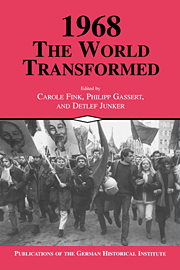Book contents
- Frontmatter
- Introduction
- Part One Tet and Prague: The Bipolar System in Crisis
- Part Two From Chicago to Beijing: Challenges to the Domestic Order
- Part Three “Ask the Impossible!”: Protest Movements of 1968
- 12 The Revolt Against the Establishment
- 13 The Changing Nature of the European Working Class
- 14 The Women's Movement in East and West Germany
- 15 1968: A Turning Point in American Race Relations?
- 16 The Revival of Holocaust Awareness in West Germany, Israel, and the United States
- 17 The Nuclear Threat Ignored
- Epilogue
- Index
13 - The Changing Nature of the European Working Class
The Rise and Fall of the “New Working Class” (France, Italy, Spain, Czechoslovakia)
Published online by Cambridge University Press: 05 January 2013
- Frontmatter
- Introduction
- Part One Tet and Prague: The Bipolar System in Crisis
- Part Two From Chicago to Beijing: Challenges to the Domestic Order
- Part Three “Ask the Impossible!”: Protest Movements of 1968
- 12 The Revolt Against the Establishment
- 13 The Changing Nature of the European Working Class
- 14 The Women's Movement in East and West Germany
- 15 1968: A Turning Point in American Race Relations?
- 16 The Revival of Holocaust Awareness in West Germany, Israel, and the United States
- 17 The Nuclear Threat Ignored
- Epilogue
- Index
Summary
Most analysts of global “1968” identify that turbulent year as the moment when new social movements emerged as powerful actors on the international political stage. Nineteen sixty-eight therefore stands as a metaphor for the eruption of the student movement reaching from Berkeley to Berlin. The associations that initially come to mind when 1968 is mentioned more closely approximate notions of cultural revolution or even sexual revolution than they do the traditional idea of a workers' revolution. Although I do not wish to detract from the ubiquitous student protests of that fateful year, in this chapter I focus attention on the proletarian dimension of 1968.
I begin this survey of working-class involvement in the battles of 1968 with a depiction of the contribution of the labor movement to the turbulent events in France, Italy, Spain, and Czechoslovakia. Here I argue for the centrality of trade union and Old Left struggles in any serious analysis of 1968 in these four countries. I then furnish a more in-depth look at the working class, which, on closer observation and despite its militancy, was perhaps more heterogeneous than at any other time in the twentieth century. Next I highlight the changing composition of the European working class in the second half of the century. Finally, I examine the internal reconfiguration of Europe's oldest ongoing social movement by focusing on the contribution of a new technical and administrative intelligentsia, called the “new working class” or “new middle classes,” to the process and the outcome of global 1968.
- Type
- Chapter
- Information
- 1968: The World Transformed , pp. 351 - 372Publisher: Cambridge University PressPrint publication year: 1998

